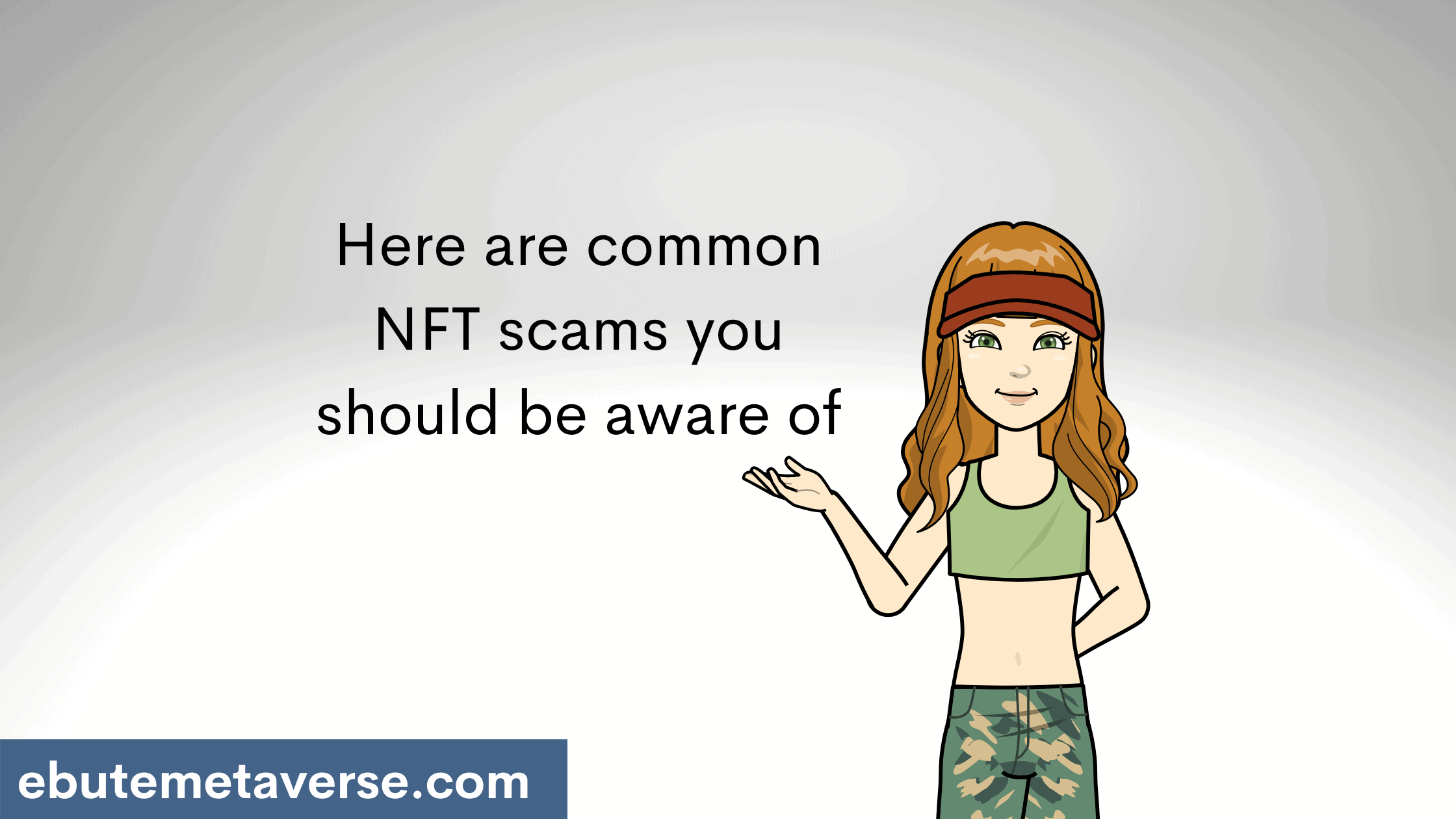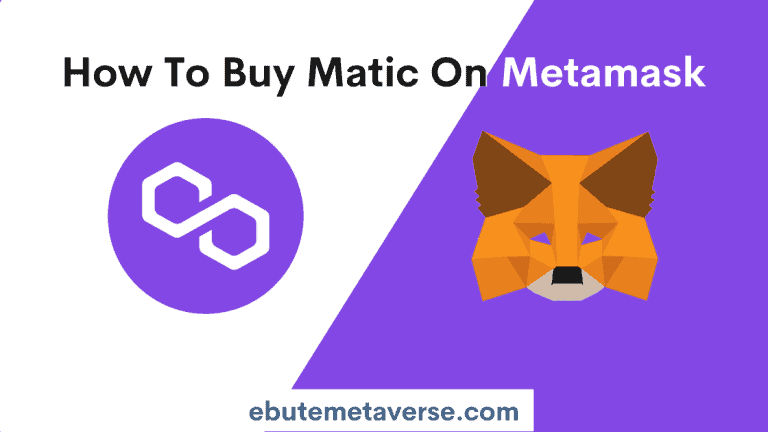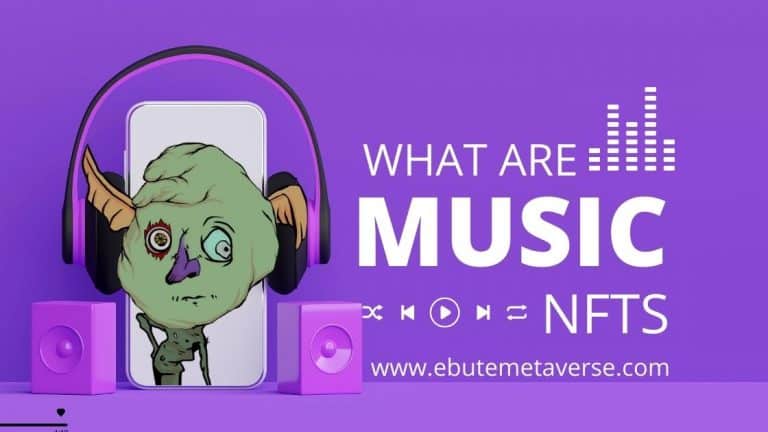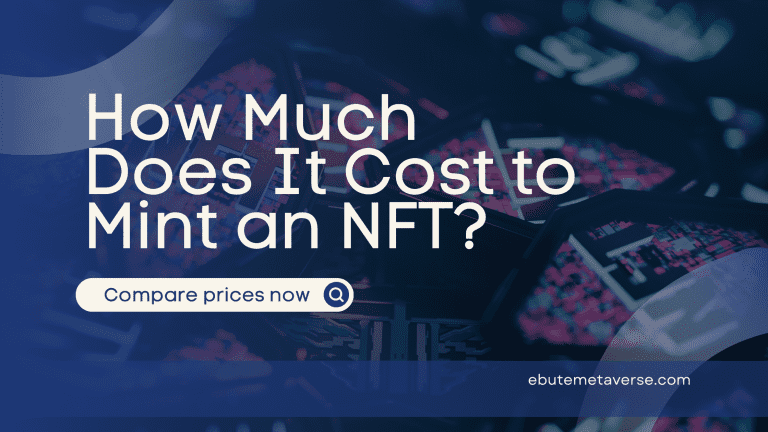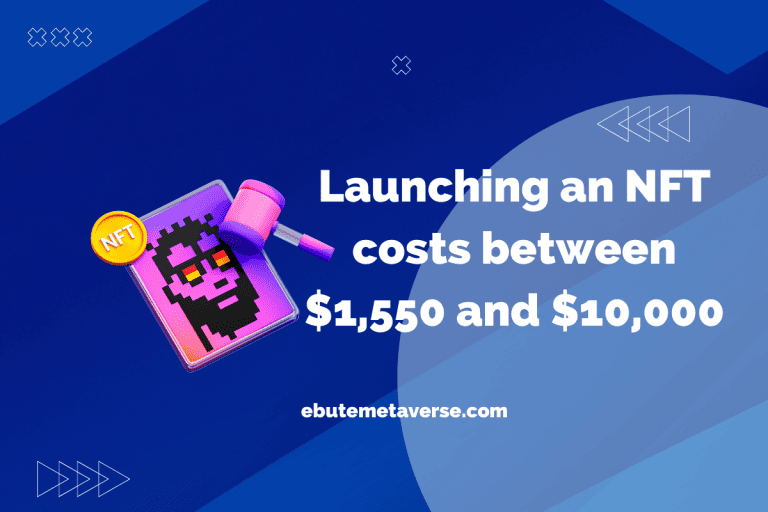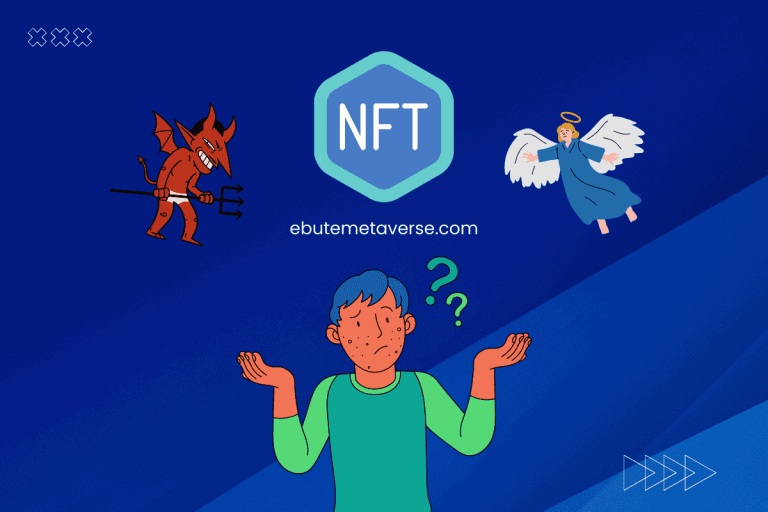14 Common NFT Scams And Practical Ways To Avoid Them
In a space where anyone can be anonymous, it’s not uncommon for scammers to lurk around. NFT scams are pretty standard, from counterfeit NFTs to fake Twitter personas.
To avoid losing your money, especially if you’re just getting started with NFTs, you must be familiar with the most common NFT scams out there.
Some common NFT scams you should avoid include rug pulls, metamask KYC scams, fake technical support, free token airdrops, and shady NFT giveaways. Others include celebrity impersonation, bidding scams, pump & dump schemes, marketplace copycats, and more.
This article will explain some common NFT scams, so you can avoid them as you try to make money in the space. Once we discover new ones, I’ll also update the list to ensure you’re always one step ahead.
MetaMask KYC Scam (NEW)
The most recent NFT phishing scam is an email from supposed MetaMask team members asking users to complete a KYC form. Here’s an image of the mail below.
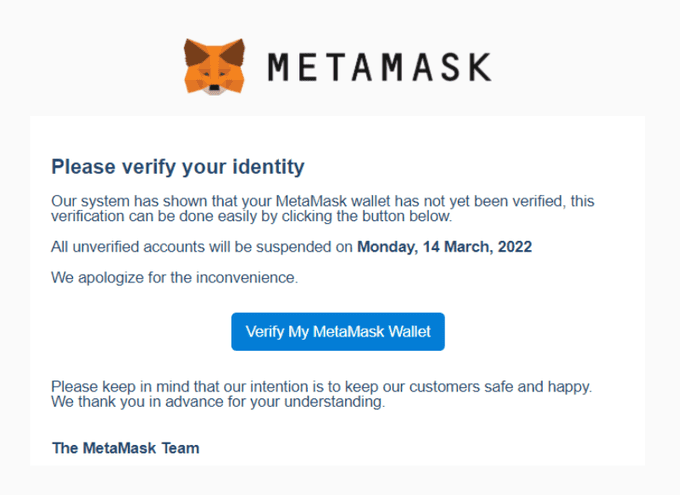
How to Avoid the MetaMask KYC Scam
It’s a no-brainer; simply ignore it. MetaMask doesn’t require KYC yet, and they surely won’t send you a mail requesting that you complete any form that will include revealing your seed phrase.
Hacking Through Discord DMs
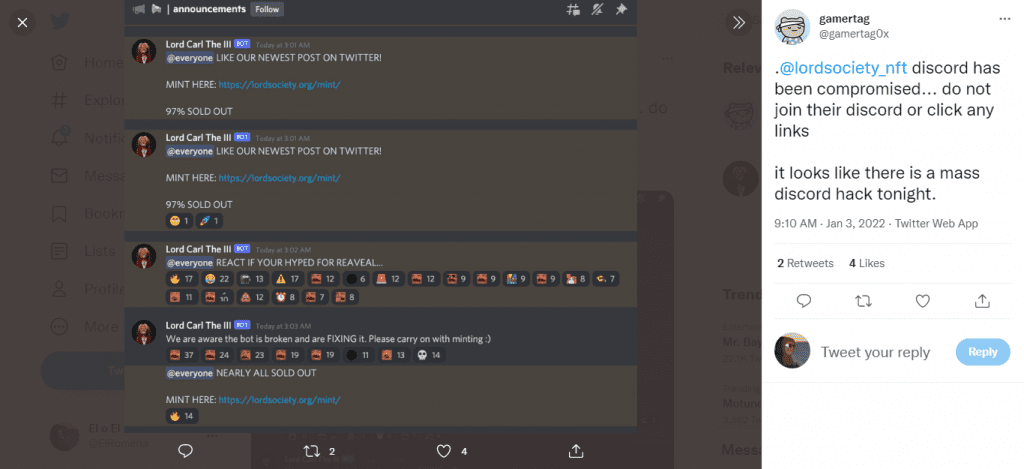
Hacking is a widespread Discord NFT scam. As a Discord server grows, so do fake invites. Scammers usually impersonate brands, artists, or NFT influencers in Discord.
When hackers gain administrator access to the Discord server, they upload bogus minting links to the announcements channel. Remember that most projects only accept “sketchy URLs” on the project’s main page. A legitimate project manager would also keep all official ties separate and approved.
How to Avoid Hacking Through Discord
You should never click on links, even if they appear to be legitimate, DMs from “friends,” or “announcements” from NFT initiatives (always check the group and ask in the group first). It’s advisable to disable direct communications in Discord to avoid falling victim to this scam. If you get an unusual message from someone you know, verify their handle first to ensure it’s them.
Fake Technical Support Scam
This is one of the most common NFT scams we see every day. The fraudster pretends to be a customer support representative for numerous NFT marketplaces and projects with the hopes of gaining access to your wallet details.
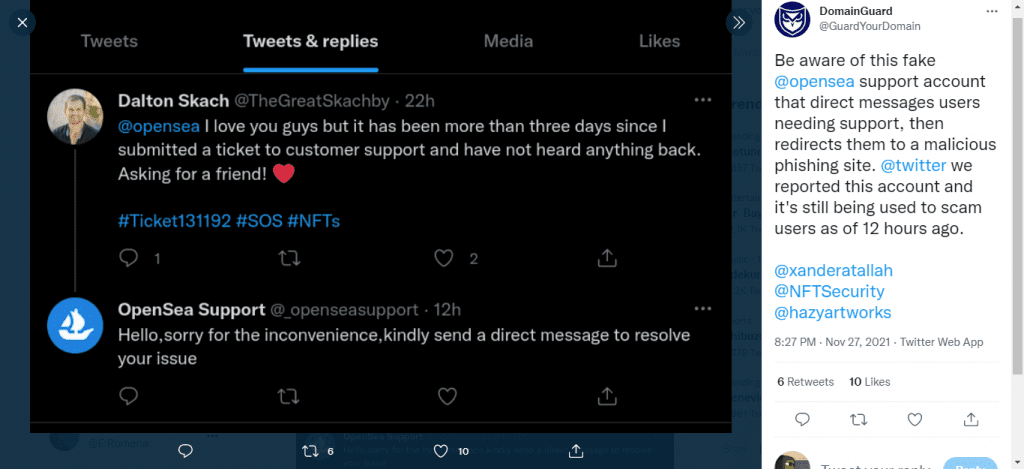
They usually comment under your post on Twitter, and Reddit sends you a direct message on Telegram and Discord asking for sensitive personal information like your seed phrase. Alternatively, they may direct you to a fake support site where you’ll be asked to connect your wallet before they can assist you.
How to Avoid Fake Technical Support Scam
It’s pretty simple: NFT project or marketplace support team will NEVER send you a private DM or offer help under your Twitter or Discord post. So, you should always be skeptical when you receive direct messages from a project’s creator.
Ensure to disable direct messaging on Discord and report such accounts when they message you on Telegram or Twitter, so they don’t scam others.
Free Token Airdrop and NFT Giveaways
This NFT scam targets people looking for free tokens or NFTs. Fraudsters create phony programs that promise you free money and prosperity. A verified account can be stolen and rebranded to look legitimate.
These phony attempts usually contain grammatical and typographical errors – but not all the time.
So, here’s how it works.
A Twitter or Discord account will message you, claiming they chose you as a winner in their ongoing NFT giveaway. Other times, they send you an email with a similar story. The message usually comes with a link directing you to a site where you can claim your airdrop or rewards.
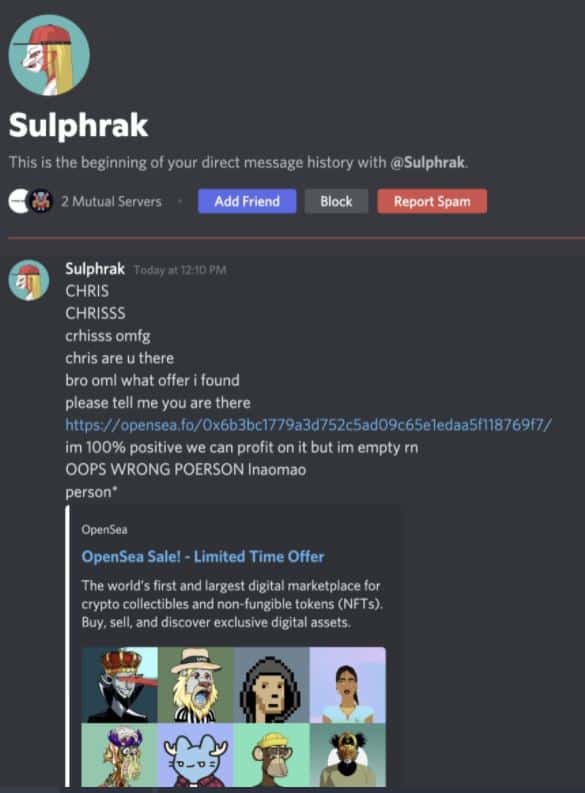
Once there, they’ll either ask for your seed phrase or tell you to connect your wallet to receive the airdrop. The scammers will immediately empty your wallet when you do, leaving you high and dry.
How to Avoid Fake Tokens and Airdrop Scams
Do not click on any link from unknown senders telling you to redeem an NFT giveaway or connect your wallet to receive an airdrop. Additionally, do not share your seed phrase with anyone – even your family and friends. Ensure to guard it with your life.
Celebrity and Brand Impersonation
As the NFT market expands, we see several celebrities and giant corporations jump in. These public figures aim to tap into the new market and find new ways to interact with fans, from sponsorships to endorsements and personal project launches.
Unfortunately, this also creates a breeding ground for impersonation. Scammers can create fake accounts to impersonate popular celebrity influencers to rug unsuspecting victims.
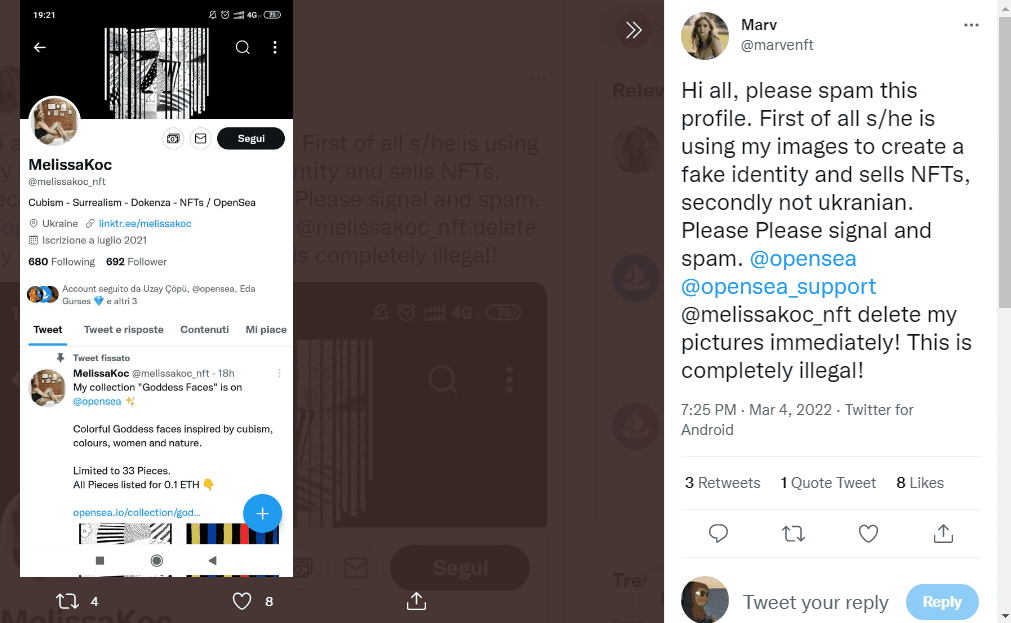
How to Avoid NFT Impersonations
Ensure to verify the username to ensure you’re not chatting with a fake account. Well-known celebrities usually have a checkmark in front of their names to distinguish their legit accounts.
Plus, buying from established artists the community has approved is the best option if you’re new to the space. There are good lesser-known artists out there but ensure to DYOR before Apeing in.
Marketplace Copycats
We’ve also seen new marketplaces spring up to cater to different asset types and blockchain projects. There are marketplaces for regular PFP projects, music NFTs, tweets, and more. However, we’ve seen fake websites set up to copy popular marketplaces like Decentraland and Opensea to sell fake replicas of projects listed on the original sites.
How to spot fake NFT marketplaces
The only way to avoid this NFT scam is to verify the marketplace URL you enter. These fake marketplaces usually use misspelled URLs, so ensure you check them thoroughly before connecting your wallet.
The Pump & Dump Scheme
Pump and dump is the practice of manipulating the price of a cryptocurrency by driving it up or down. In crypto and NFTs, the pump and dump tactic is a staple. This occurs when a significant number of NFTs are purchased by a single individual or a group of persons to inflate demand artificially.
Usually, scammers sell off their assets, leaving everyone else with worthless NFTs and substantial losses. In some cases, these NFT materials could be counterfeit; they have been dubbed or un-minted as the case may be.
How to Avoid Pump and Dump scam
To avoid falling victim to the pump and dump scheme, you should study the transaction history of that particular NFT. A legitimate project should have a broad spectrum of buyers, not simply a handful who buy and resell. When you come across such NFTs in the market, avoid participating in any transactions.
Bidding scams
False bids have been a terrible swindle for several people in recent times. Investors who seek to resell their purchased NFTs on a secondary market may fall victim to a big scam.
When you advertise your NFT for sale on a marketplace, buyers may bid with low-value cryptocurrencies instead of your preferred currency without informing you.
For example, you list your asset for 0.17 ETH, and someone bids on it for 2.0 BNB. If you don’t check properly and approve the bid, you automatically sell your asset for a lesser value than intended.
How to Avoid Biding Scam
Always pay attention to the bid amount and currency use. Don’t be in a hurry to accept a bid because it’s higher than what you listed.
Innovative Scams
While I’ve done my best to cover the most common NFT scams and how to avoid them, this one is pretty difficult to spot and remedy. We all know hackers to be innovative people and will always find new ways to cause harm. So always ensure to be extra careful. A Twitter handle known as Babbler Dabbler reported a scam where his MetaMask Wallet and OpenSea were hacked just by trying to get rid of the trashy NFTs he found in his wallet. Here’s the thread.
How to Avoid Innovative Scams
For this particular case, when you see suspicious NFTs in your wallet, first move out your valuable assets before interacting with them. Better still, always use a burner wallet for significant transactions.
A burner wallet is simply a separate wallet you use for holding your least valuable assets and some tokens for easy transactions. In contrast, your main wallet will hold most of your portfolio. You should also invest in a hard wallet.
Counterfeit NFTs
People have bought fake NFTs thinking they were getting the real thing. Counterfeit NFTs scam happens when unsuspecting purchasers buy an NFT with no value. In most cases, an artist’s work is stolen by scammers, who then put it up for auction in a marketplace.
NFTs are all about metadata and when the token was created on a blockchain. Therefore, keep that in mind when you’re looking at replicas. Never trust an NFT’s appearance to serve as your sole source of authentication. Buying pricey and sought-after NFTs requires extensive research (especially if the artwork is going for less than it should be).
How to Avoid Counterfeit NFTs scam
Ensure to check the transaction data to verify if it’s accessible elsewhere. Then look up the NFT smart contract contrast these data with what you know.
Also, ensure that the account you’re purchasing from is the seller’s genuine account – it usually has a blue checkmark in front. There shouldn’t be many versions if it’s a 1/1 with a blue check.
Rug Pull Scams
The NFT space is filled with potential rug projects. Unfortunately, they’re difficult to detect. An NFT rug pull is when a project gets overhyped on social media to gain many investors. Once they get enough buyers and raise the floor price, they disappear into thin air with all the money, leaving buyers with worthless digital assets.
The case of ‘Evolved Apes‘ is a prevalent example of this scheme, where the founder reportedly vanished with $2.7 million in cash after abandoning his project. This causes the NFT price to plummet to zero, resulting in losses for investors in the NFT.
How to avoid Rug Pull Scams
The only way to avoid an NFT rug pull is by doing extensive research on the project – don’t just ape in. Study their roadmap, check for bots and robot-looking engagement on their socials, and ask questions on their Discord servers.
Also, run a background check on the devs behind the project. While anonymity is popular among devs these days, you can simply check their social media profiles and rate their engagement. If they have a huge following but little interaction, then it’s probably going to rug.
Fake Mints
If you like keeping tabs on your favorite influencer’s wallet movement, then you might fall for this common NFT scam. NFT enthusiasts sometimes monitor the wallet actions of influential bigwigs to know what they’re buying and possibly get in on the same project.
Scammers will seize this opportunity to send a misleading marketing narrative by sending unsolicited projects to the influencer’s wallet address, making it look like they minted the NFTs.
How to Avoid Fake Mint Scam
Resist the urge to FOMO because your favorite influencer minted a new collection. You should visit the OpenSea or marketplace page to check the transaction. Click on the Etherscan link to check if the developers themselves sent the token to the influencer.
Phishing Scams
Users’ private wallet keys or 12-word security seed phrases are requested in the NFT phishing scam via fraudulent websites and pop-ups. After gaining access to your wallet’s private keys, scammers will hack into your wallet and remove all of your crypto and NFTs.
How to Avoid Phishing Scams
The best way to avoid phishing scams is to never give out your wallet’s keys in pop-ups or on dubious websites. Only use reputable websites for crypto transactions, and never enter your wallet seed phrase in any pop-up, link, or email.
Catfishing
It’s easy to get catfished because NFT sales are virtual, and all marketing is social. NFT communities frequently hire influencers and celebrities for promotion, making it difficult to discern genuine ones. Catfishing happens when a brand or celebrity sends you a DM, asking you to do anything or sign up for something before they will buy your NFT.
Usually, the scammer may say something like, “I have X amount of ETH to spend; tell me your project.” MetaMask wallet screenshots with absurd amounts of ETH in them are often included in these posts as well.
How to Avoid Catfishing Scam
To survive in the NFT space, you need to be vigilant. For budding artists, who haven’t yet sold anything, the lure of a client eager to be their first customer may be quite enticing. The best course of action would be to avoid them at all costs: run away, delete, block, report, whatever.
General Precautions to Protect Yourself From These Common NFT Scams
You can protect yourself from the above NFT scams. To begin, we’ll start with the most critical one:
- Never disclose your seed phrase or password for any reason.
- Incoming DMs from “friends” should always be double-checked in the message history.
- If you see a link with the words “giveaway” or “airdrop” on Discord, don’t click on it.
- Always have a burner wallet for minting new NFTs and holding little cash for transaction.
- Invest in a hard wallet like Ledger Nano or Trezor to keep majority of your portfolio.
Conclusion
Being familiar with these common NFT scams gives you an edge to avoid them as you transact in the market. It would help if you also adopted the above tips to stay protected in the NFT marketplace. Remember, anything that seems too good to be true isn’t. Always protect your seed phrase, DYOR and avoid FOMO at all costs.

